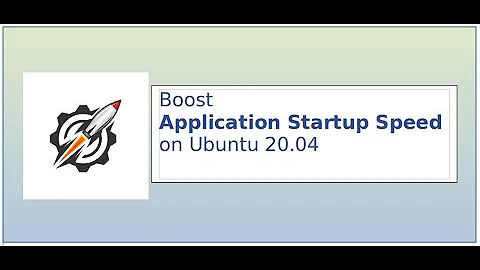Long boot delay on Ubuntu loading/splash screen following regular dist-upgrade on clean SSD install (18.04)
Solution 1
This is a kernel related regression, the launchpad bug is: https://bugs.launchpad.net/ubuntu/+bug/1779827
As a workaround, press keys and/or move the mouse at boot.
In a nutshell services that use /dev/urandom or getrandom() now block until enough entropy is available. In the past much less entropy was required for /dev/urandom.
The latest status from https://bugs.launchpad.net/ubuntu/+source/linux/+bug/1779961/comments/5 is that:
The meta-packages have been rolled back and the fix is in progress of being applied and uploaded.
The snapd team also looked into this and worked with bson upstream to ensure no /dev/unrandom is needed to startup (https://github.com/snapcore/snapd/pull/5464)
So this problem should be fixed via either a kernel or a snapd update soon.
Solution 2
You can move mouse or increase entropy in system.
sudo apt install haveged
Works for default kernel and from ukuu. This allows the system to boot up correctly on kernel 4.17.4.
Solution 3
I've seen this manifest on two desktops I manage. Running the following command to install rng-tools solves the issue for me:
sudo apt install rng-tools
From Arch wiki: The rng-tools is a set of utilities related to random number generation in kernel. This is mainly useful to increase the quantity of entropy in kernel to make /dev/random faster.
Solution 4
i've the same issue with 4.15.0-24-generic #26-Ubuntu SMP
user@nb:~$ systemd-analyze blame |head
4min 2s plymouth-quit-wait.service
1.440s systemd-udev-settle.service
562ms dev-sda1.device
313ms udisks2.service
240ms systemd-rfkill.service
231ms NetworkManager.service
194ms networkd-dispatcher.service
180ms systemd-backlight@backlight:acpi_video0.service
179ms systemd-journal-flush.service
147ms systemd-logind.service
For a temporary workaround, you just need to move your mouse / touchpad while booting, resulting in a "normal" boot time; in my case:
user@nb:~$ systemd-analyze blame |head
1.440s systemd-udev-settle.service
882ms plymouth-quit-wait.service
562ms dev-sda1.device
313ms udisks2.service
240ms systemd-rfkill.service
231ms NetworkManager.service
194ms networkd-dispatcher.service
180ms systemd-backlight@backlight:acpi_video0.service
179ms systemd-journal-flush.service
147ms systemd-logind.service
Fix Source: https://ubuntuforums.org/showthread.php?t=2395451&p=13780509#post13780509
Related videos on Youtube
Broadsworde
Updated on September 18, 2022Comments
-
 Broadsworde over 1 year
Broadsworde over 1 yearI'be been running 18.04 since a clean SSD install on the day of it's official release, without issues.
Power on to login was seconds (max 10)Then, I did a regular upgrade this morning:
$ sudo apt update && sudo apt dist-upgradeThe packages installed/upgraded were:
Install: linux-headers-4.15.0-24:amd64 (4.15.0-24.26, automatic), linux-headers-4.15.0-24-generic:amd64 (4.15.0-24.26, automatic), linux-modules-extra-4.15.0-24-generic:amd64 (4.15.0-24.26, automatic), linux-modules-4.15.0-24-generic:amd64 (4.15.0-24.26, automatic), linux-image-4.15.0-24-generic:amd64 (4.15.0-24.26, automatic) Upgrade: gnome-control-center-data:amd64 (1:3.28.1-0ubuntu1.18.04.1, 1:3.28.1-0ubuntu1.18.04.2), linux-headers-generic:amd64 (4.15.0.23.25, 4.15.0.24.26), gnome-control-center:amd64 (1:3.28.1-0ubuntu1.18.04.1, 1:3.28.1-0ubuntu1.18.04.2), linux-image-generic:amd64 (4.15.0.23.25, 4.15.0.24.26), linux-signed-generic:amd64 (4.15.0.23.25, 4.15.0.24.26), gnome-control-center-faces:amd64 (1:3.28.1-0ubuntu1.18.04.1, 1:3.28.1-0ubuntu1.18.04.2), linux-generic:amd64 (4.15.0.23.25, 4.15.0.24.26)I rebooted once the upgrade had completed, and noted a 2-3 minute delay on the Ubuntu loading/splash screen (prior to login) (without any progress/activity indicated on the dots).
I powered off and tried to boot again, but am getting this delay consistently now. Also close down is much slower too.
Update #1 (2018-07-03):
Analysis on systemd:$ sudo systemd-analyze blame 3min 53.073s plymouth-quit-wait.service 2min 20.699s snapd.seeded.service 49.949s snapd.service 6.186s NetworkManager-wait-online.service 1.148s dev-sda2.device 1.098s plymouth-start.serviceShowing that
plymouth-quit-wait.service(which I now believe is related to the Ubuntu loading/splash screen) andsnapd.seeded.servicewere by far the longest running services to initiate. So I compared the times before thedist-upgradeand after:$ journalctl -u plymouth-quit-wait.service --since today -- Logs begin at Fri 2018-04-27 13:01:30 BST, end at Tue 2018-07-03 12:38:05 BST. -- Jul 03 04:15:43 user-laptop systemd[1]: Starting Hold until boot process finishes up... Jul 03 04:15:46 user-laptop systemd[1]: Started Hold until boot process finishes up. -- Reboot -- Jul 03 04:21:17 user-laptop systemd[1]: Starting Hold until boot process finishes up... Jul 03 04:24:52 user-laptop systemd[1]: Started Hold until boot process finishes up.Before the upgrade
plymouth-quit-wait.servicetook 3 seconds. After the upgrade it took 3 minutes 35 seconds$ journalctl -u snapd.seeded.service --since today -- Logs begin at Fri 2018-04-27 13:01:30 BST, end at Tue 2018-07-03 12:42:14 BST. -- Jul 03 04:15:43 user-laptop systemd[1]: Starting Wait until snapd is fully seeded... Jul 03 04:15:43 user-laptop systemd[1]: Started Wait until snapd is fully seeded. -- Reboot -- Jul 03 04:22:47 user-laptop systemd[1]: Starting Wait until snapd is fully seeded... Jul 03 04:24:49 user-laptop systemd[1]: Started Wait until snapd is fully seeded.Before the upgrade
snapd.seeded.servicetook 0 seconds. After the upgrade it took 2 minutes 2 seconds.Update #2 (2018-07-06):
This morning's boot saw the return of the delay.
So I guess we're still waiting for the kernel/plymouth/snapd update.Update #3 (2018-07-12):
The problem seems to be resolved, but I didn't see any update to snap or plymouth, and I'm still running 4.15.0-24 kernel. So I'm not sure which package update fixed the problem, or if it just resolved itself somehow. Reading the bug updates on launchpad it's unclear to me what was done (or is being done) to what package/s. If anyone can clarify that would be very useful.-
 user535733 almost 6 yearsLooks to me like snapd was seeding (refreshing the snap database) for 2:20. A rare event, nothing broken. If it does that every time, file a bug against snapd.
user535733 almost 6 yearsLooks to me like snapd was seeding (refreshing the snap database) for 2:20. A rare event, nothing broken. If it does that every time, file a bug against snapd. -
 Broadsworde almost 6 yearsThanks for that. So far the snapd seeding is consistently running at over 2 mins each boot after the dist-upgrade, having taken zero seconds before it.
Broadsworde almost 6 yearsThanks for that. So far the snapd seeding is consistently running at over 2 mins each boot after the dist-upgrade, having taken zero seconds before it. -
Alessandro Gaballo almost 6 yearsI'm having the same issue after a new installation of Ubuntu 18.04:
3min 57.515s plymouth-quit-wait.service2min 24.588s snapd.seeded.service -
user605331 almost 6 yearsI had this same issue today after upgrading my kernel to 4.15.0-24-generic.
-
 user535733 almost 6 yearsConsider starting a thread on forum.snapcraft.io . That's where the snap developers hang out. Be sure to start a thread ONLY if you're willing to help them troubleshoot and test. Everybody should subscribe to the same thread, and avoid useless 'me too' comments - keep the noise down so the developers don't get discouraged and turn off.
user535733 almost 6 yearsConsider starting a thread on forum.snapcraft.io . That's where the snap developers hang out. Be sure to start a thread ONLY if you're willing to help them troubleshoot and test. Everybody should subscribe to the same thread, and avoid useless 'me too' comments - keep the noise down so the developers don't get discouraged and turn off. -
 Broadsworde almost 6 yearsI logged a bug at: bugs.launchpad.net/snapd/+bug/1779872 I'm certainly willing to help troubleshoot
Broadsworde almost 6 yearsI logged a bug at: bugs.launchpad.net/snapd/+bug/1779872 I'm certainly willing to help troubleshoot -
 sudodus almost 6 yearsThis bug affected my Ubuntu 18.04 LTS system the first time I booted after upgrading the kernel. But the second and third times I booted, it no longer affected my Ubuntu.
sudodus almost 6 yearsThis bug affected my Ubuntu 18.04 LTS system the first time I booted after upgrading the kernel. But the second and third times I booted, it no longer affected my Ubuntu. -
 David Foerster almost 6 yearsCould you please open a new question if you have a new or follow-up question? If you tack hardly related questions onto existing questions you broaden their scope which makes them harder to answer. On top of that it likely invalidates existing answers. I took the liberty to revert the edit that adds the follow-up question. Thanks. I took the liberty to revert those drastic changes.
David Foerster almost 6 yearsCould you please open a new question if you have a new or follow-up question? If you tack hardly related questions onto existing questions you broaden their scope which makes them harder to answer. On top of that it likely invalidates existing answers. I took the liberty to revert the edit that adds the follow-up question. Thanks. I took the liberty to revert those drastic changes. -
msc almost 6 yearsThis is NOT a problem related to a development version of Ubuntu. It relates to the released version 18.04 and was triggered by a regular and clearly broken software update sent to all users.
-
-
 Broadsworde almost 6 yearsI just tried the "shift" boot and that seemed to reflect the boot to login times I had been seeing before the update... so what is broken here? BTW, "shift" at boot didn't give me a grub menu, but it did give me a login much quicker.
Broadsworde almost 6 yearsI just tried the "shift" boot and that seemed to reflect the boot to login times I had been seeing before the update... so what is broken here? BTW, "shift" at boot didn't give me a grub menu, but it did give me a login much quicker. -
 Fabby almost 6 yearsMichael, could you edit this answer and incorporate the information from your other answer into this one and then delete the other one? We like one question, one answer here... Thank you! ;-)
Fabby almost 6 yearsMichael, could you edit this answer and incorporate the information from your other answer into this one and then delete the other one? We like one question, one answer here... Thank you! ;-) -
 Zanna almost 6 yearsplease contact a mod to have your accounts merged
Zanna almost 6 yearsplease contact a mod to have your accounts merged -
 sudodus almost 6 years@Broadsworde, Spamming (repeated hitting) the shift key or the Esc key in Ubuntu 18.04 LTS brings up the grub menu for me. (It is not enough to just keep the key down; I guess it can differ between computers.)
sudodus almost 6 years@Broadsworde, Spamming (repeated hitting) the shift key or the Esc key in Ubuntu 18.04 LTS brings up the grub menu for me. (It is not enough to just keep the key down; I guess it can differ between computers.) -
 WinEunuuchs2Unix almost 6 yearsInteresting solution. I don't have the problem yet because I recently switched to
WinEunuuchs2Unix almost 6 yearsInteresting solution. I don't have the problem yet because I recently switched to4.4.0-130for Virtualbox experimenting, but I installedhavegedto future-proof my machine.


![How To UPGRADE To UBUNTU 22.04 LTS Easily [ NO DATA LOSS ]](https://i.ytimg.com/vi/z5MpPczeSm0/hqdefault.jpg?sqp=-oaymwEcCOADEI4CSFXyq4qpAw4IARUAAIhCGAFwAcABBg==&rs=AOn4CLAUbvEUZHLz8Xby3yajKt-l6js8NQ)

